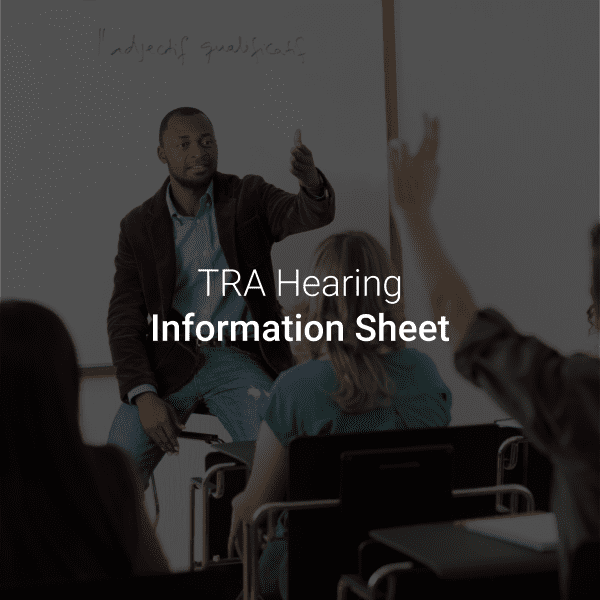The latest guidance on Teacher’s Disqualification by Association under the Childcare Act 2006
In October 2014, the Department for Education (DoE) published supplementary guidance to schools regarding the disqualification by association requirements for teachers. The DoE published that school staff that live or work in the same household as someone who has a criminal conviction, are disqualified from working in a school.
Initially this guidance caused significant confusion in schools, and caused many teachers being suspended or dismissed from their jobs. As a result the DoE have reviewed this guidance and on the 26th February 2015 issued new guidance in relation to this. This new guidance replaces the October 2014 document, and has aimed to clarify the position of schools and teachers in relation to disqualification by Association; the new guidance is called ‘Disqualification under the Childcare Act 2006.’
You can download the latest guidance here.
The guidance will be reviewed in September 2015.
Who is covered by the latest guidance?
- Staff members that are covered by this guidance includes anyone that provides early years childcare or later years childcare in a school setting.
Early year’s childcare is from birth up to and including reception age. Later year’s childcare is above the reception age but any child that has not attained the age of eight.
-
Any member of staff that is involved in the day to day management of such childcare is also covered, such as the head teacher and the school leadership team.
-
Staff members that provide early year’s childcare are covered under this guidance both during and outside of school hours.
Outside of school hours refers to any members of staff that provide after school supervision to children under the age of eight and before school settings such as breakfast clubs. However this does not include detentions or school clubs such as sports teams.
-
Staff members that provide later year’s childcare are also covered under this guidance but this is only outside of school hours not during school hours.
Who is not covered by this guidance?
-
Staff members that are not involved in any management provisions for such child care are not covered.
-
Staff that are not directly involved in providing supervision to children or young people that are eight years of age or older.
-
Staff such as caretakers, cleaners, drivers, transport escorts, catering and office staff are not covered by the legislation. Also, anybody involved in any form of health care provision for a child, such as school nurses are not covered by the legislation.
It is the responsibility of the schools and local authorities to exercise their judgement on when and whether staff members come under the scope of the legislation.
Responsibility of schools
Schools are responsible for making sure they make all staff aware of the disqualification guidance.
When gathering such information, schools need to make sure they act proportionately and minimise wherever possible the intrusion into staff member’s private lives.
There are no set guidelines on how a school may inform their staff of this legislation. However, some ways this can be done are by including this in their safeguarding policy, by adding this into the employment contract of any new staff or drawing the guidance to the attention of their staff.
Declaration forms
Schools need to take steps to gather information about whether any member of staff who comes under the guidance is disqualified by association or not.
One approach to this is by getting the staff members to fill out self declaration forms; however this is not necessarily the only approach that can be taken.
If a school decides to use self declaration forms as a means of collecting the relevant information, the school needs to be careful that only the relevant information is asked within the scope of the legislation. For example any questions regarding a caution or conviction for a relevant offence.
Staff that fall within the scope of the legislation do not have to disclose all cautions or convictions, these include:
-
Spent convictions relating to someone living in or employed to work in their household.
-
Old and minor cautions or convictions which the Disclosure and Barring Service (DBS) have filtered from their DBS certificate.
Offences that can never be filtered by the DBS can be found here.
Schools must be careful when asking for information whilst establishing whether a member of staff is disqualified by association, as they may not be entitled to certain information or may even be in breach of the data protection legislation.
It is advisable that head teachers take HR or legal advice in order to clarify which information they are allowed to request from staff and how this information should be recorded.
What if a staff member is disqualified?
Firstly, the school should contact their HR provider, legal provider, LADO, safeguarding lead officer or advisor and explain the circumstances.
If the school has obtained enough information to come to the conclusion that the member of staff is disqualified by association then their next step should be to inform Ofsted of this.
A school must not continue to employ the staff member that has been disqualified; they should inform the member of staff that they have contacted Ofsted regarding this. The school must also explain the implications of disqualification to the individual.
Ofsted Waiver
If a member of staff is disqualified by association, they should be informed by the school that they have the right to apply to Ofsted for a waiver. Schools should explain to the individual that details about how to make an application for a waiver, and a copy of the form, can be found in the Ofsted fact sheet.
Options whilst an Ofsted waiver is being considered
Until the outcome of a waiver does not come back, the school has other options rather than to dismiss the individual. Schools can redeploy the staff away from the relevant age groups or adjust their role accordingly.
When making redeployment decisions, schools should consider the risk of harm to children concerned and their obligations under the 2006 Act, the EYFS, KCSIE guidance and any other relevant safeguarding guidance.
If it is not possible to redeploy the individual then the school should consider granting the individual paid leave or something similar. If neither of these options are feasible then as a last resort, suspend the member of staff whilst the waiver is considered.
Options if a staff member does not apply for a waiver or if it is declined
The school will have to make a decision of whether it is possible to permanently redeploy the staff member or whether steps should be taken to dismiss the individual.
If you would like to discuss the issues raised in this article further, contact one of our specialised lawyers today. Additionally, read our teacher lawyers service page for more information.




